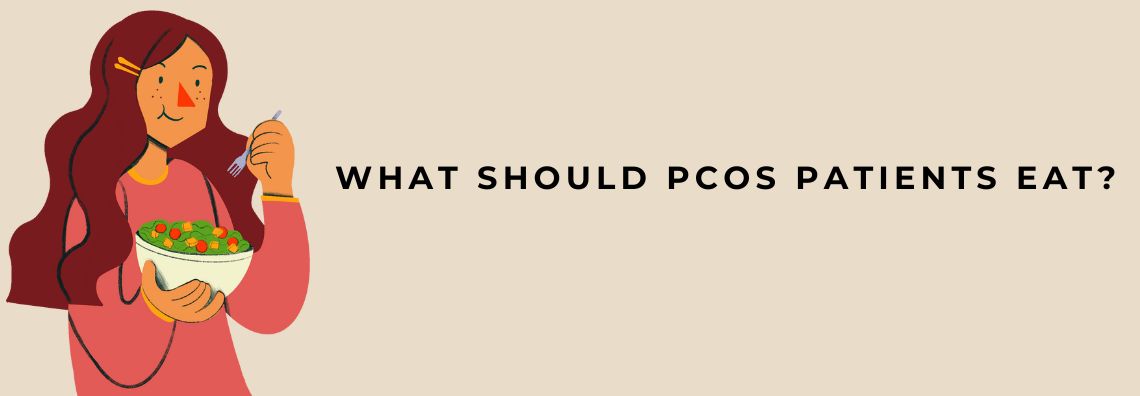
“For years, people had made it so normal for a female to tolerate the worst kind of pain during her periods…..it’s high time, we make it not normal and find solutions for it.”
Polycystic Ovary Syndrome,in short PCOS is a disorder formed in a female’s body that includes overproduction of male hormones called Androgens. This leads to production of immature eggs from the ovaries that then develop into cysts in the ovaries.
The most evident and known signs of PCOS are irregular periods or no periods at all for months or years. This ultimately leads to infertility in females or even if gets pregnant, the pregnancy will be full of complications and risks.
Though the disease is incurable or the cure for it is still not found out by doctors or researchers, it is totally possible to control and reduce the symptoms and complications caused by it.
By exercising, taking relevant medicine and following a balanced and personalized diet for your own self, according to your unique body and needs, the problems caused by the disorder could be controlled and managed.
How Does Diet Affect the Symptoms of PCOS?
PCOS causes insulin resistance in the body of a person. It means that a person has insulin levels higher than normal. Insulin is a hormone secreted by pancreas that helps to convert sugars/ glucose into energy.
What happens is that when a person is diagnosed with PCOS, her insulin doesn’t get consumed fully to convert the sugar in the body into energy. This leads to high levels of sugars in the body of the patient.
To tackle this, the body tries to produce even more insulin. Now this high insulin levels causes ovaries to produce more androgens like testosterone.
This all eventually makes it harder to lose weight and maintain a healthy body mass index.
So a diet that focuses on these two aspects will definitely be a game changer for the person suffering from PCOS. It is called a low glycemic index (GI) diet, meaning a diet that has food items that do not cause insulin levels to get high as much as items with carbohydrates does.
Do’s of Diet-
High Fiber Food
Taking a fiber rich diet helps to combat the insulin resistance in the body.
This also helps to slow down digestion and reduce the effect of sugars on the blood.
Some fiber rich foods are:
- Green and red peppers
- Almonds
- Berries
- Cruciferous vegetables
- Beans and lentils
- Pumpkin
Protein Diet
A diet that has high proteins in it is filling and nutritious.
Some examples of protein rich foods are:
- Tofu
- Chicken
- Fish
Anti- inflammatory Food Items
Patients of PCOS often face the problem of Chronic inflammation in their body so, adding anti- inflammatory food items in your diet could help a lot with this issue.
Some examples of anti- inflammatory food items are:
- Kale
- Tomatoes
- Strawberries
- Olive Oil
- Walnuts
- Spinach
Don’ts of Diet-
Carbohydrates
If the amount of carbohydrates are more in a person’s diet, especially the refined carbohydrates, then this leads to inflammation and exacerbates insulin resistance also.
Some food items to avoid as much as you can if you have PCOS:
- White bread
- Muffins
- Breakfast pastries
- Sugary desserts
- Anything made with white flour
Replacing wheat flour with bean or lentil flour could prove to be a healthy alternative.
Sugars
Sugars also are a form of carbohydrates and are selled in the market with various names like Sucrose, High fructose corn syrup, Dextrose.
Foods to avoid to reduce sugar consumption are:
- Beverages like juice and sodas
- Sugary candies and chocolates
Inflammatory Food Items
Processed and red meats should be avoided and the other packaged and processed foods should be avoided as they cause more inflammation in the body of the patient.
It is hard to live a normal, generous life when you have PCOS, but it is possible to have a better and more easy life by including this or that in your daily routine.
Following a balanced diet will not only reduce the symptoms but at the same time will make you feel better, light and cleaned from inside.
Now, while signing off from here, we do want to mention how important it is to consult a pcos specialist whenever you start to notice some symptoms in your body that align with that of PCOS. A PCOS specialist will not only diagnose the disorder but at the same time will guide you to a better and self loving journey. A professional and knowledgeable doctor could make a diet plan for you and could help you towards better alternatives to add on your diet, could make an exercise plan for you and also could help you to mentally deal with the disease.